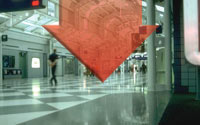
Despite gains, consumers are
still sweating about the economy, and growing increasingly fierce in their convictions that the government is to blame. And the nation’s retailers have their own fears, with fuel costs bumping
unemployment out of first place for the first time since 2009.
Taken together, the two studies paint a picture of larger struggles for retailers in the months ahead.
The Boston
Consulting Group’s just-released Consumer Sentiment Survey, its 11th, reports that 94% of U.S. respondents feel the government should hold "a good share" or more of the blame for the
nation's debt crisis. (The survey included 15,000 consumers in 16 countries, and that sentiment was strong in other Western countries as well.)
advertisement
advertisement
And 47% of U.S. respondents feel financially
insecure or in trouble, with 31% of U.S. households saying they are unable to save. And while 46% of Baby Boomers 55 and over are anxious about their financial future, Milennials are much more
concerned, with 57% reporting their anxiety.
Perhaps more concerning is that they are more gloomy about how long economic recovery will really take, with 43% agreeing things won’t get
much better in the next several years.
The study also found some poignant global contrasts, with just 21% in the U.S. agreeing the next generation will have a better life, compared with 83% of
Chinese consumers.
BCG pinpointed values that are rising and falling within each country, with luxury, status and bright colors falling in the U.S., and health, saving and value for money
rising. Their top three wants? Money, less stress and security.
Despite that pessimism, a new report from BDO reveals that retail execs are less worried about downcast shoppers than external
factors, including the rising cost of fuel, data breaches, and sourcing.
The report, based on securities filings of the 100 largest retailers, found that 71% of retailers cite the cost of gas
as a primary economic risk, up from 58% last year. And while 68% are still concerned about the economy, it’s down from its 70% peak in 2010.